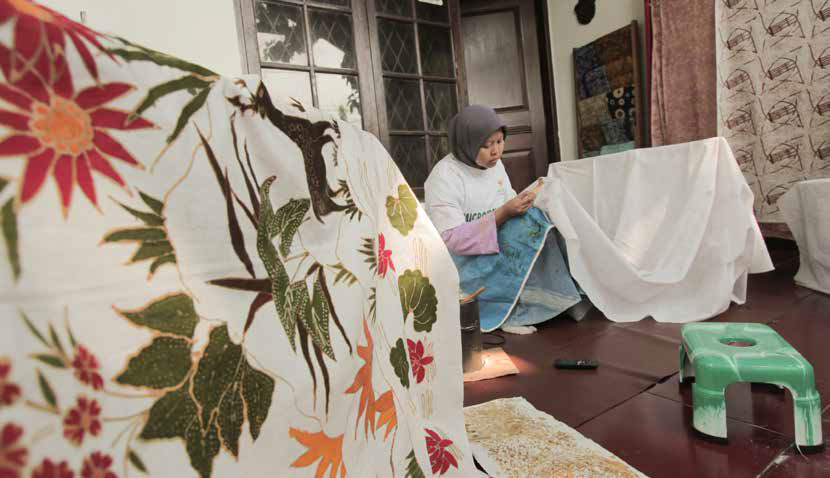Batik is a beautiful traditional Indonesian fabric. It is made by wax-resist dyeing application on cloth using a spouted tool called a canting or a copper stamp. The decorated designs and symbols represent the culture of the batik’s place of origin. Each design conveys specific value and meaning to those who wear it. On October 2, 2009, UNESCO recognised batik as an Intangible Cultural Heritage of Humanity. Since then, we have celebrated October 2 as National Batik Day. In addition, many institutions, either public or private, wear uniforms made of batik.

Moreover, batik also has been used as a diplomacy tool in Indonesia’s international relations. Many world leaders appreciate batik and wear it at the United Nations official meetings. Historically, batik has played a significant role in Indonesia’s struggle for independence. Indonesian batik businessman, Samanhudi, founded the Islamic Merchant Union (Sarekat Dagang Islam) on October 16, 1905. It was one of the pioneer organisations to struggle for Indonesia’s independence from colonialism. The Islamic Merchant Union also helped the traditional batik artisans to access raw materials from Chinese markets (Matanasi, 2020). In addition, Islamic Merchant Union also facilitated the traditional batik producers to get educated and eliminate poverty. The influence of the Islamic Merchant Union has since widened outside Java to become an outfit that has struggled to emancipate Indonesia from colonialism and other social shackles (Prabowo, 2020).
Historically, batik has played a significant role in Indonesia’s struggle for independence. Indonesian batik businessman, Samanhudi, founded the Islamic Merchant Union (Sarekat Dagang Islam) on October 16, 1905. It was one of the pioneer organisations to struggle for Indonesia’s independence from colonialism. The Islamic Merchant Union also helped the traditional batik artisans to access raw materials from Chinese markets (Matanasi, 2020). In addition, Islamic Merchant Union also facilitated the traditional batik producers to get educated and eliminate poverty. The influence of the Islamic Merchant Union has since widened outside Java to become an outfit that has struggled to emancipate Indonesia from colonialism and other social shackles (Prabowo, 2020).

However, even after 76 years of independence, the condition of the batik sellers and producers is not ideal. According to the Association of Indonesian Batik Craftsmen and Entrepreneurs, imported batik printing has stagnated the local business. (Hamdani, 2019). To address this problem, the government has barred importing textile products containing batik design through the Regulation of Minister of Trade No. 64/M-DAG/PER/8/2017. This regulation is expected to give breathing space to the batik producers.
The COVID-19-induced economic disruption created new difficulties. Many batik events, such as Inacraft, Adiwastra, Indocraft, and so forth, had to be canceled during the lockdowns. As per the Association of Indonesian Batik Craftsmen and Entrepreneurs estimates, the revenue shrunk to 70 percent. Many batik sellers had to lay off employees or switch to other professions for survival (Rosmalia, 2020). Given the hardship faced by the batik producers and sellers, the national zakat agency (BAZNAS) initiated a zakat empowerment program in 2018 (Intan, 2018). Under this program, the Batik artisans, producers, and sellers are given technical training on modern and contemporary designs to meet market expectations. They also get monetary assistance and leadership guidance to expand the business. During the training programs, the participants are introduced to sustainable dyeing procedure that uses natural colouring materials such as Curcuma longa (turmeric), Terminalia catappa (country almond), and Dracaena Angustifolia (suji leaves). The technique reduces water pollution.
To enhance market exposures, BAZNAS and other stakeholders celebrated the eco-fashion week in December 2018. The eco-friendly products are good for the environment and carry high market value.

In 2019 BAZNAS also launched the Village Batik Cibuluh program to empower local batik artisans in Cibuluh, Bogor. The idea behind the initiation of this program was to brand the neighbourhood as Batik Village through training, mentorship, and capital assistance. For example, people were trained to make batik murals on walls.
Another program run by BAZNAS to offset the effects of the lockdown was the cash-for-work program. Similarly, a campaign was started to educate the villagers about the danger of the COVID-19 virus. Assistance was also extended to some families in the area of urban farming.
These examples show that zakat used to revive an ancient practice like batik can have a positive impact. It is similar to struggling for freedom like the batik sellers and producers did 75 years back. Ideally, this model should be replicated in other parts of Indonesia to support local batik artisans and revive the community-based tourism post the COVID-19 pandemic. However, for sustained and swift results, a collaboration of a broader scale to access and gain market exposure should be embraced immediately.
About the author:
Randi Swandaru is a graduate academic assistant at INCEIF, Malaysia.
‘’TO ENHANCE MARKET EXPOSURES, BAZNAS AND OTHER STAKEHOLDERS CELEBRATED THE ECO- FASHION WEEK IN DECEMBER 2018. THE ECO-FRIENDLY PRODUCTS ARE GOOD FOR THE ENVIRONMENT AND CARRY HIGH MARKET VALUE. ‘’



